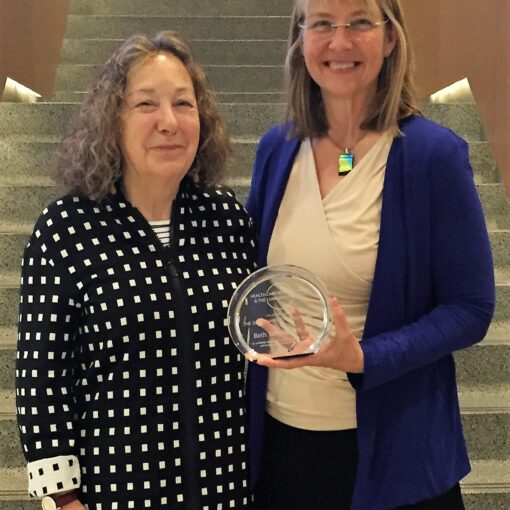Held Virtually May 1 – 2, 2024
Legislators need to hear from nurses now more than ever.
Join the Alliance of Nurses for Healthy Environments for our 2024 Congressional Virtual Hill Days on May 1 – 2.
While there has been significant progress and gains in environmental health at a federal level, it is important that nurses continue to reinforce that environmental action is critical to protecting health. On May 1 – 2, 2024 nurses will meet with members of Congress to share legislative priorities that will protect the progress made in environmental protection and climate action. Through the Congressional Hill Days, nurses will ensure their voice is heard by Congressional offices.
Through participation in the Congressional Hill Days, nurses will have the chance to have your voice heard by Congressional offices. The ANHE team will provide guidance and materials for attendees prior to Hill visits to ensure impactful visits with members of Congress. Even if they’ve never met with a legislator or their staff before, ANHE staff will make you feel prepared and you will soon feel like an experienced advocate. You don’t need to attend both days, for those that sign up, ANHE will schedule ½ hour virtual legislative visits with offices in your respective legislative district based on your availability.
The Alliance of Nurses for Healthy Environments recognizes that influencing public policy, both regulatory and legislatively at all levels of government is key to promoting healthy people and healthy environments through advancing environmental protection and reducing environmental harm. For our 2024 Congressional Virtual Hill Days, ANHE urges Congress to:
Support the highest level of funding possible for environmental protection in fiscal year 2025.
- Provide $110 million under the Centers for Disease Control and Prevention’s environmental health capacity line in the FY 2025 Labor, Health and Human Services, Education and Related Agencies Appropriations bill to support state and local health departments in their efforts to prepare for and protect their communities from climate-related environmental health hazards.
- Increase funding for the Environmental Protection Agency (EPA) to $12 billion in the fiscal year 2025 (FY25) Interior, Environment and Related Agencies Appropriations bill for the agency to meet critical environmental protection objectives.
- Fund the Office of Climate Change and Health Equity (OCCHE) at $5 million in the FY 2025 Labor, Health and Human Services, Education and Related Agencies Appropriations bill. This funding is needed to protect the health of all people in the face of climate hazards and to address the climate impacts on the health care sector.
Defend and implement the Clean Air Act and its health-based National Ambient Air Quality Standards to protect the health of all.
- In 2024, EPA has recently finalized new clean car standards, a multipollutant emissions reduction program for light-duty and medium-duty vehicles. These standards, which apply to vehicle model years 2027-2032, are a big step forward in cleaning up the country’s transportation sectors and putting us on the path to a zero-emission transportation future.
- In 2024, EPA also finalized the latest round of clean truck standards. These Phase 3 greenhouse gas standards gradually ramp up emissions performance minimums for HDV manufacturers’ on-road fleets (on a weighted average basis). Between 2027 and 2032, each manufacturer’s on-road HDV fleet will be required to achieve incrementally cleaner emissions performance.
- In 2024, EPA strengthened the National Ambient Air Quality Standards for Particulate Matter (PM NAAQS) which will protect millions of Americans from harmful and costly health impacts. Particle or soot pollution is one of the most dangerous forms of air pollution and it’s important this standard and EPA’s ability to set standards is not rolled back.
Oppose attacks that would permanently weaken the Clean Air Act. Specifically, members of Congress should oppose:
- Air Quality Standards Implementation Act (HR 7650) or better known as the Smoggy Skies Act. This bill would make communities wait longer to see stronger limits on ozone and particle air pollution in the future. This misguided bill will permanently undermine the role of health as the basis for the U.S. Environmental Protection Agency (EPA) setting air pollution limits. The bill would even weaken implementation of the new, stronger limits on particulate matter pollution that EPA just finalized – despite the fact that nearly 80% of voters across party lines support EPA’s stricter standards for particle pollution.
- National Ambient Air Quality Standards Implementation Act of 2023 (S 2125) would result in similar weakening to the Clean Air Act as outlined in HR 7650.
- Modernizing Clean Air Permitting Act of 2024 (S 3826) introduces technological feasibility into the standards-setting process, which is not consistent with the Clean Air Act. The NAAQS are to be set solely based on what science says is needed to protect health and the changes to permitting requirements proposed in this bill make it easier for some industries to get out of complying with a new NAAQS.




